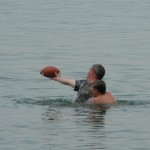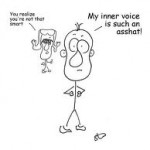Irony of ironies, my series on the art of writing medicine has been unavoidably delayed these past couple of months by having to write my own board exams. I’ve passed, which makes me a fully qualified neurologist. It’s a tremendous thing to be able to say that, after four years of medical school and five years of residency; it also gives me some weight on what a credible physician character can be.
I have talked in past entries about how easy prey physicians are for cliché in fiction. To some extent, that isn’t surprising, as doctors and physicians are stock characters that show up regularly in genre work, often as a simple background fountain of exposition, sometimes as a noble, compassionate hero who starts her day reciting the Hippocratic Oath over her morning coffee. Sometimes the reverse happens, and the doctor is secretly an evil character who conducts unethical experiments or is involved in a vast conspiracy (often with a pharmaceutical company) for no other reason than the money. Take a look at any science fiction story or television show; odds are high that there will be an episode or a segment where the doctor struggles with healing the enemy, or where an unscrupulous physician is called out by a morally sound one on a violation of ethics. Money or research prestige is usually at stake, with justifications about it being for the good of science. It’s usually a surgeon, too, which makes my physician’s heart calcify with jealousy.
That isn’t to say that these tropes are always bad, but they can descend quickly into cliché. They’re easy to fall into as well, and it happens when the medicine takes over from the character.
So how to avoid the slide into cliché? The easiest answer is to write true characters who happen to be doctors, and many other posts have talked about how to write good characters in your story. Here are a few other pointers, though, which may help the next time you have a doctor among your cast.
1. Not every doctor is a bloody surgeon or emergency room specialist. Sorry, that may be my own pet peeve. But pity the poor internist, or family doctor, or geriatrician. It’s been a fond hope of mine to see a physician-hero who happens to be a radiologist someday. But in all seriousness, the practice of medicine is wide and varied, and not every doctor goes to the operating room or runs a trauma code.
2. Do some research into the training. For the most part, it takes at least six years of schooling after an undergraduate degree to become a doctor, yet it’s not uncommon to see preternaturally gifted doctors in fiction that went to medical training straight out of high school. That doesn’t happen, and it strains credulity to have your doctor too young.
3. Not every doctor does everything. The moment House lost its magic for me was when Alison Cameron, nominally an infectious diseases specialist, was the lead on a brain biopsy, which requires years of neurosurgical training. Some doctors are able to do many things in many different fields; these are generalists, like family doctors and general internists. Having your trauma surgeon show a sudden expertise in managing a heart attack or a stroke – that doesn’t happen. If you need your doctor to be able to do a specific thing, then plan that as you create your character – or have them acknowledge that they’re out of their depth if the situation calls for it.
4. There is life outside of the hospital. We do more than see patients; we teach and research, we shop for groceries and mow the lawn, we get flat tires and go to the bathroom. Keep in mind that doctors are human beings and that having sworn the Hippocratic Oath doesn’t take away from all of our other needs and secrets. Write your doctors as human beings, and make them more than just their profession.
5. The same tricks apply even if your physician is just a means for exposition. Having some hint of a back-story can help make the difference between a piece of furniture delivering dialogue and a good minor character that helps to flesh out the world that you’ve built.
6. As with any aspect of medicine that you write, read up on the medical science. If the doctor you write doesn’t know what he’s talking about, it’s going to show.
There actually aren’t many other tricks to writing physicians that don’t apply to writing people from other professions or occupations. The bottom line is that medicine is an occupation, not a character description, so you’re going to need more than that to flesh them out. Done poorly, doctors in fiction can stand out as tired clichés, but done well? Many of the greatest works of fiction have had physicians as strong characters. Maybe yours will be next.









